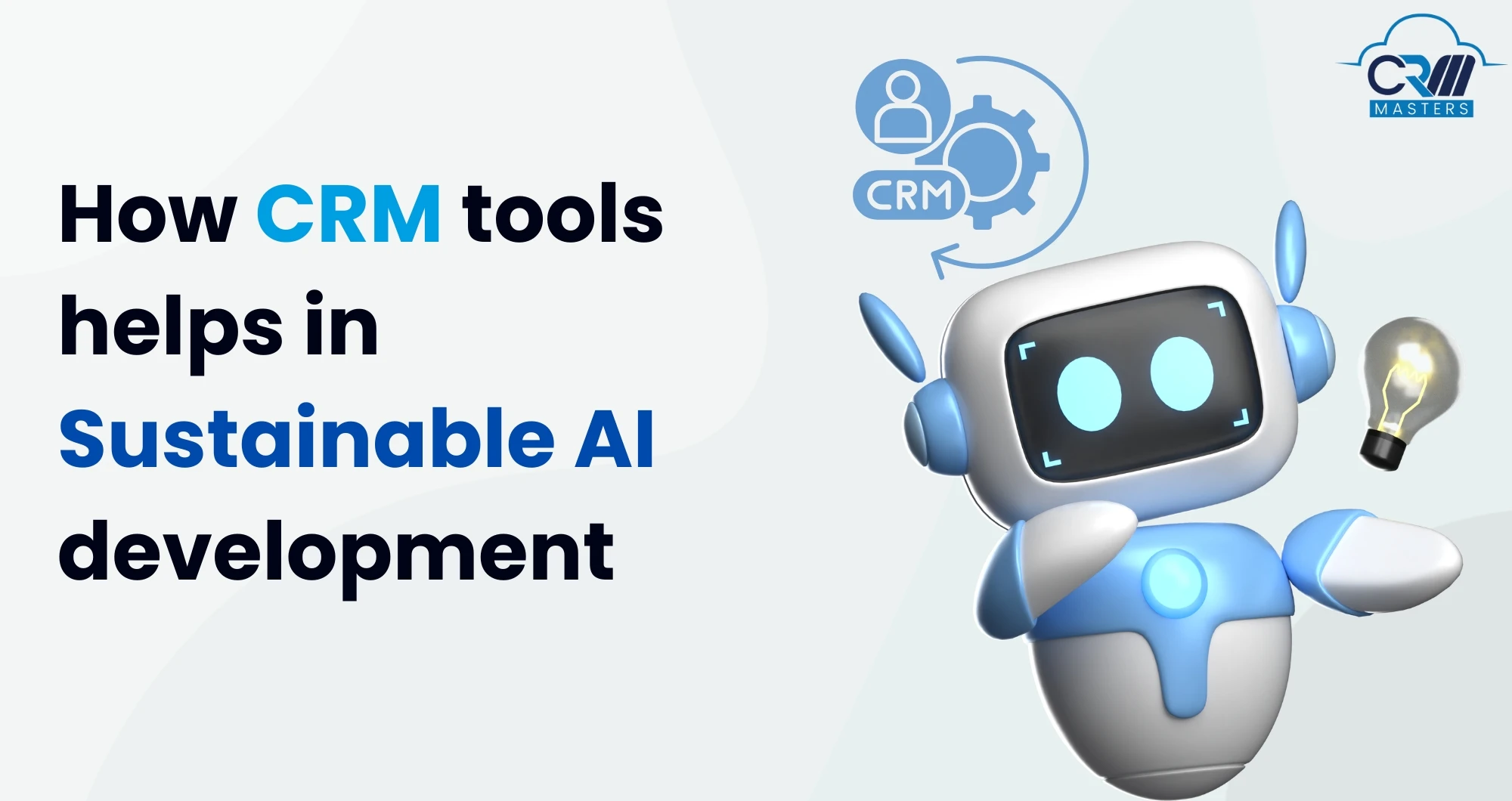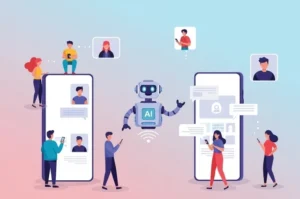
How CRM Tools Support Sustainable AI Development in 2025
As more people become concerned about the environment and take the right actions, Sustainable AI is no longer just a buzzword. It’s something that companies and organisations need to do to stay relevant, responsible, and efficient. But what does this mean for companies? What can AI and sustainability do together to make the future better?
We provide Zoho Consulting Services and we understand how vital the right tools are in achieving this balance. In this blog, we’ll explore the world of sustainable AI, discussing how artificial intelligence can support environmental goals, and how CRM systems like Zoho CRM can play a key role in enabling the responsible development of AI technologies.
What is Sustainable AI and Why Does it Matter?

Sustainable AI refers to the development and deployment of AI systems that are environmentally conscious, economically viable, and socially responsible. Unlike traditional AI models, which may have hidden costs such as high energy consumption, waste generation, or ethical dilemmas, sustainable AI aims to minimize these negative impacts while optimizing performance.
To make AI more sustainable, we need to make it work better, make sure that data is used responsibly, and encourage openness. Sustainable AI isn’t just about making AI models that use less energy; it’s also about making systems that work towards bigger goals for society.
Key Elements of Sustainable AI:
- Energy Efficiency: Reducing the power consumption of AI models.
- Ethical AI: Ensuring AI systems operate within ethical frameworks.
- Data Integrity: Making sure the data used for training AI systems is accurate, transparent, and responsibly sourced.
- Resource Optimization: Using computational resources and hardware in a way that minimizes environmental impact.
AI and Sustainability: A Perfect Match
AI has the potential to drive positive change in sustainability across numerous sectors like manufacturing, healthcare, E-commerce, trading, professional services, education, finance, and much more. Whether it’s optimizing resource usage or improving management systems, AI offers innovative solutions that can help businesses achieve global sustainability goals.
How CRM Tools Help in Sustainable AI Development?

Customer Relationship Management (CRM) tools have become essential for organizations looking to streamline their processes, improve customer experiences, and ultimately drive business growth. But did you know CRM tools can also play a significant role in the development of sustainable AI?
1. Data Management
AI-powered CRM systems can make data entry, cleaning, and improvement easier. This helps keep data accurate and organized for AI use. Having good data is important for training and improving AI models, resulting in better and more dependable AI solutions.
2. Enhanced Decision-Making with AI
By integrating AI into CRM tools, companies can analyse customer behaviours, optimise supply chains, and forecast demand. This helps businesses operate more sustainably while also improving their efficiency.
3. Collaboration and Communication for Sustainability
CRM systems give businesses the tools they need to work together and discuss with stakeholders, even those who are focused on sustainability goals. These tools make sure that businesses can keep their AI projects in line with their goals for sustainability and keep track of their progress.
4. Efficient Lead Management
When AI is added to CRM, it can look at a lot of customer data and quotes to find the best leads. This enables sales teams to focus on the best prospects, which saves time and money and makes the most of their resources.
Also Read: Top Free CRM for Small Businesses
Importance of AI and Sustainability in the Modern Business
As AI continues to expand, its role in sustainability becomes even more important. Businesses and governments alike are increasingly recognizing the need to combine these two forces for long-term success. Sustainable AI offers both environmental and financial benefits, and it is fast becoming a competitive advantage in the marketplace.
1. Compliance with Regulations
As governments around the world start to implement stricter environmental regulations, businesses must adopt AI solutions that are both efficient and sustainable. AI that’s developed with sustainability in mind will help businesses stay ahead of regulatory requirements while minimizing penalties.
2. Positive Public Image and Consumer Trust
Mostly, customers are now becoming environmentally friendly and choose the brands that are aligned with their values. Companies that implement AI for sustainability not only contribute to the environment but also improve their public image, leading to increased customer trust and loyalty.
3. Financial Benefits of Sustainable AI
Energy-efficient AI models reduce operational costs, and the optimisation of business processes through AI leads to greater overall profitability.
Also Read: How CRM Software Can Help Reduce Costs for Your Business
The Role of CRM Tools in Sustainable AI Development
As the need for sustainable AI grows, businesses can leverage tools like CRM systems to ensure that their AI models are not only effective but also ethically and environmentally responsible. With CRM tools helping to collect and manage data efficiently, businesses are better equipped to design AI systems that contribute to a more sustainable future.
At CRM Master’s Infotech, as CRM consultants, we specialise in integrating AI into customer management processes that align with sustainability goals. By implementing CRM systems designed for responsible AI development, we help businesses thrive in a future that is both technologically advanced and environmentally sound.
Are you ready to explore how CRM tools can help drive your sustainable AI initiatives?
Get in touch with us today to create a future where innovation and sustainability go hand in hand.
FAQs
Q1: What is sustainable AI in business?
Ans: Sustainable AI refers to developing and using artificial intelligence in ways that minimize environmental impact, reduce bias, and promote long-term ethical practices.
Q2: How can CRM tools support ethical AI development?
Ans: CRM systems ensure clean, accurate, and transparent customer data—critical for training fair and efficient AI models.
Q3: Which CRM is best for AI-powered sustainability initiatives?
Ans: Zoho CRM and Salesforce are leading platforms, offering AI-driven insights while enabling compliance and sustainability reporting.
Q4: Can CRM tools help reduce environmental impact?
Ans: Yes, by optimizing customer interactions and automating tasks, CRMs cut down on wasted marketing, printing, and energy consumption.
Q5: What are examples of sustainable AI in CRM systems?
A: Examples include AI-driven lead scoring that reduces redundant outreach, predictive analytics for demand forecasting, and eco-friendly customer segmentation.












